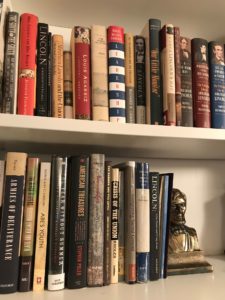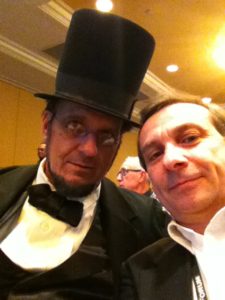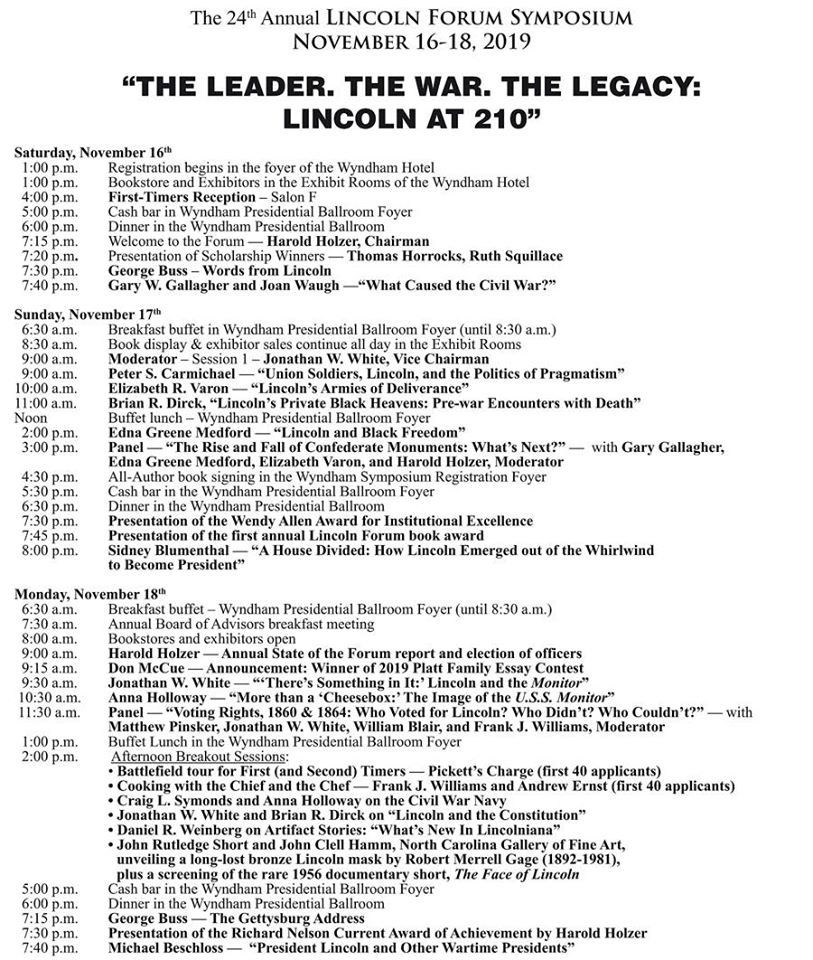 This week I officially became President! So much has been going on that I figured a quick professional update was in order.
This week I officially became President! So much has been going on that I figured a quick professional update was in order.
I am now President of the Lincoln Group of DC. The previous president, John O’ Brien, shepherded us through a pandemic-induced upheaval of our usual routine, shifting us to a Zoom-based virtual format for our monthly formerly-dinner lectures in a DC restaurant. The virtual meetings actually let us reach members now spread across the country who had been missing out. Our challenge now is to resurrect our in-person dinners while maintaining a more far-reaching virtual program. John also took charge of moving us from our old website platform to a new Wix-based one, a process that is still ongoing. One of the best features of our new site, Lincolnian.org, is a news blog where we can update people on upcoming events of the group, plus Lincoln news from around the country. In addition to my own author website (this one) and my experimental/opinion webite (Hot White Snow), I’ve been writing much of the content for the Lincolnian.org blog, writing book reviews for the Lincolnian newsletter, writing occasional articles for the newsletter, and maintaining and posting on the Lincoln Group’s Facebook and Twitter pages.
As President I’ll have the privilege of working with a great group of Vice Presidents and other Board members to provide service to our members and the community. There are big plans already in the works, including the aforementioned in-person dinners, our ongoing Study Group, next year’s Lincoln Memorial Centennial commemoration, a four-part short-course on Lincoln for ENCORE in the fall, battlefield tours, possible silent auctions, and an expanded national presence. We’ll be looking for additional opportunities to collaborate with other groups, like the “Teaching Lincoln” panel in January for a private club’s Civil War Roundtable and the “Case for Honoring Lincoln” panel for the Illinois State Society, the latter of which included discussions of Lincoln’s Native American and African American policies.
That isn’t the only Lincoln organization I’ve taken on new responsibilities for. In March I joined the Executive Committee and took over as Treasurer for the Abraham Lincoln Institute, another non-profit whose mission is to promote the scholarship of Abraham Lincoln. I’ve been on the Board for the last four years and now will be managing the finances. I’m also on the Book Award review committee, which means reading a dozen or more new Lincoln books a year and winnowing them down to a single award winner. I’ll also be more involved with a third organization, the Lincoln Forum, whose annual three day symposium I’ve attended for the last seven years. As we come back from a virtual year to a planned in-person event in November, I’ve been asked to join their Board of Advisors.
And then there is the book. Midway through May I have completed the draft of my new book examining Lincoln’s commitment to science. I’m in the editing process now and will be submitting the manuscript to the publisher next month. The planned release is February 2022, give or take. Once the manuscript is accepted I’ll start to talk more about its content, reveal the cover, reveal the prominent public figure who wrote the Foreword, and other news specifically about the book. Stay tuned.
This year should also see a return to travel. With the pandemic (hopefully) receding (fingers crossed), I’m looking forward to resuming my “Chasing Abraham Lincoln” travel. This summer I have plans to visit my family in New England for the first time in over a year. I’m already booked to join my brother on a catamaran sailing excursion in the British Virgin Islands this November (returning just in time to head to Gettysburg for the Lincoln Forum).
And of course there will be book marketing in preparation for the new book’s release. Plus I’ll be finishing up a second work in progress, working on two others in progress, and starting the research for yet another book I hope to get a proposal out on before the end of the year.
Onward!
David J. Kent is the author of Lincoln: The Man Who Saved America. His newest Lincoln book is scheduled for release in February 2022. His previous books include Tesla: The Wizard of Electricity and Edison: The Inventor of the Modern World and two specialty e-books: Nikola Tesla: Renewable Energy Ahead of Its Time and Abraham Lincoln and Nikola Tesla: Connected by Fate.
Follow me for updates on my Facebook author page and Goodreads.



 Robert Todd Lincoln was the oldest of Abraham and Mary Lincoln’s four sons, and apparently an assassination jinx in a story that includes several presidents, Nikola Tesla, and Thomas Edison.
Robert Todd Lincoln was the oldest of Abraham and Mary Lincoln’s four sons, and apparently an assassination jinx in a story that includes several presidents, Nikola Tesla, and Thomas Edison. Sure, I write a lot about Abraham Lincoln these days, but for more than thirty years I was a practicing scientist. One area of sciences that was severely lacking was leadership. I’m lucky enough to be related to an expert on leadership in the sciences, and he has a new book out that I want to highlight for all my science colleagues.
Sure, I write a lot about Abraham Lincoln these days, but for more than thirty years I was a practicing scientist. One area of sciences that was severely lacking was leadership. I’m lucky enough to be related to an expert on leadership in the sciences, and he has a new book out that I want to highlight for all my science colleagues. Given COVID, the election, the post-election, and everything else that happened this year, it should come as no surprise that my Abraham Lincoln book acquisition pattern was different that in previous years. While last year I had a big jump in the number of new Lincoln books I acquired (
Given COVID, the election, the post-election, and everything else that happened this year, it should come as no surprise that my Abraham Lincoln book acquisition pattern was different that in previous years. While last year I had a big jump in the number of new Lincoln books I acquired (
 Well, the worldwide coronavirus outbreak has certainly caused a lot of disruption lately. Like everyone else, I’m social distancing (even more than usual), which means tons of cancellations of upcoming appearances and presentations.
Well, the worldwide coronavirus outbreak has certainly caused a lot of disruption lately. Like everyone else, I’m social distancing (even more than usual), which means tons of cancellations of upcoming appearances and presentations.
 This was a big year in Abraham Lincoln book acquisitions. My average number of new books acquired has been a fairly consistent 58 books over each of the last five years. This year was 82. While that’s a big jump from my average, it still falls short of the 98 I acquired back in 2013.
This was a big year in Abraham Lincoln book acquisitions. My average number of new books acquired has been a fairly consistent 58 books over each of the last five years. This year was 82. While that’s a big jump from my average, it still falls short of the 98 I acquired back in 2013. A funny thing happened on the way to the Lincoln Forum. After a career as a scientist, I became a Lincoln historian. And in a few days I’ll have the chance to join 300 of my colleagues at the annual Abraham Lincoln Forum.
A funny thing happened on the way to the Lincoln Forum. After a career as a scientist, I became a Lincoln historian. And in a few days I’ll have the chance to join 300 of my colleagues at the annual Abraham Lincoln Forum.







